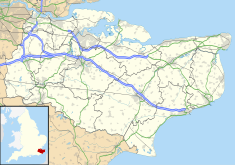The Shoreham Memorial Cross is a Christian cross hill figure carved into a chalk escarpment above the village of Shoreham, Kent. The concept of the cross was the idea of a Shoreham man, Samuel Cheeseman, two of whose sons had been killed on active duty during the First World War. It was carved between May and September 1920 on land donated by Francis Mildmay who had also served in the war. In October 2021 Historic England designated the cross a scheduled monument.
| Shoreham Memorial Cross | |
|---|---|
 | |
| Location | Shoreham, Kent, England |
| Coordinates | 51°20′12″N 0°10′23″E / 51.3366183°N 0.1731759°E |
| Built | 1920 |
| Architectural style(s) | Hill figure |
| Official name | Shoreham Memorial Cross |
| Designated | 21 October 2021 |
| Reference no. | 1474978 |
History
editThe village of Shoreham is located in the Shoreham Valley, an area of undulating and wooded escarpments depicted by the artist Samuel Palmer in the 1820s.[1] In 1920 Samuel Cheesman, a local resident, determined to carve out a cross on the hillside to the west of the village, to commemorate two of his sons and the other men forty-eight men of Shoreham[2] who had been killed during the Great War.[3] The site was donated by a local landowner, Francis Mildmay, who cut the first turf on Empire Day, 24 May 1920. The cross was complete by September 1920.[a][3] On Remembrance Sunday Samuel Cheeseman would drag a small cannon to the cross and fire salvos to mark the beginning and the end of the Two-minute silence.[4] In 1921 the official village war memorial was erected near the bridge over the River Darenth. The cross is referenced in the inscription on the war memorial, which reads; ‘SHOREHAM / KENT / REMEMBER / AS YOU LOOK / AT / THE CROSS / ON THE HILL / THOSE / WHO GAVE / THEIR LIVES / FOR / THEIR COUNTRY / 1914-1919’.[5] By the early 21st century the sightline from the church to the cross had been blocked by trees, but the view was restored by felling in 2010.[6]
Description
editThe cross is cut from the chalk hillside and surrounded by an edging of carved chalk blocks.[7] It is 30m long and 18m wide, the left hand bar being slightly longer than the right to correct the perspective when viewed from the village. In 2021 Historic England designated the cross a scheduled monument.[8] Its listing record describes the cross as "an eloquent witness to the tragic impact of world events on this local community" and notes its near-unique status as a "very rare surviving example of a hillside memorial cross".[b][3]
See also
editNotes
edit- ^ Other sources give a completion date of September 2021.[4]
- ^ Historic England records the only other known example of such a hillside cross as that in the nearby village of Lenham.[3] The Lenham Cross is a Grade II listed structure.[9]
References
edit- ^ Newman 2012, pp. 538–541.
- ^ "Shoreham memorial cross anniversary service". BBC News. 3 July 2011.
- ^ a b c d Historic England. "Shoreham Memorial Cross (1474978)". National Heritage List for England. Retrieved 15 December 2021.
- ^ a b Wright, Dan (21 May 2020). "History of Kent's chalk landmarks: Wye Crown, Folkestone White Horse, Lenham Cross and Shoreham Cross". Kent Online.
- ^ Historic England. "Shoreham War Memorial (Grade II) (1427626)". National Heritage List for England. Retrieved 15 December 2021.
- ^ Sherlock, Peter (30 September 2010). "View of Shoreham Cross restored in Kent". BBC News.
- ^ McPolin, Sean (15 December 2021). "Shoreham Memorial Cross among 400 sites to be given protected status by Historic England". Kent Online.
- ^ Davies, Caroline (15 December 2021). "Yorkshire windmill added to England's national heritage list". The Guardian.
- ^ Historic England. "The Cross - a hill-figure war memorial at Lenham (Grade II) (1438738)". National Heritage List for England. Retrieved 15 December 2021.
Sources
edit- Newman, John (2021). Kent: West and The Weald. The Buildings of England. Newhaven, US and London: Yale University Press. ISBN 978-0-300-18509-6. OCLC 875767298.
